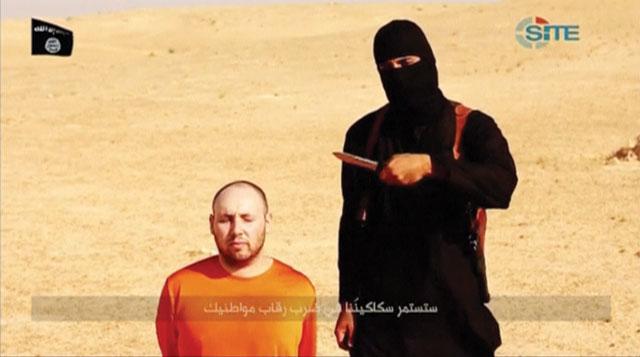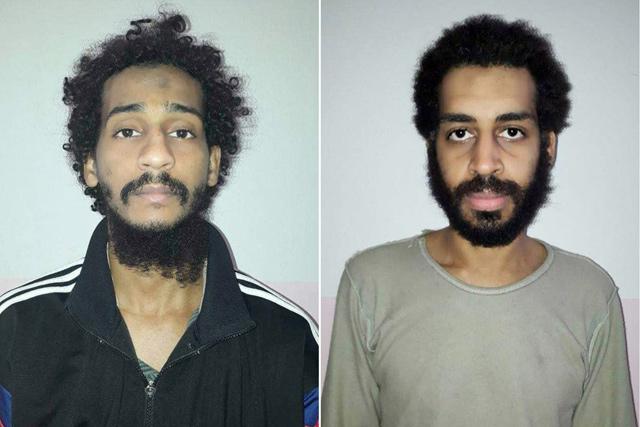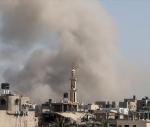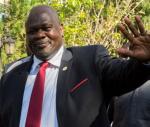You are here
Daesh executioner ‘Jihadi John’ named by media
By AFP - Feb 26,2015 - Last updated at Feb 26,2015

LONDON — "Jihadi John", the masked Daesh militant apparently responsible for beheading Western hostages, was named on Thursday as Kuwaiti-born London computer programmer Mohammed Emwazi.
A Washington Post report citing friends, a leading think tank researching foreign jihadists and a British security official quoted by the New York Times identified Emwazi as being the executioner.
The Guardian and the BBC in Britain also named him without citing sources.
But London's Metropolitan Police dismissed the reports as "speculation" and said it was "not going to confirm his identity".
The International Centre for the Study of Radicalisation at King's College in London said it believed the identity "to be accurate and correct".
Cage, a civil rights group that was in contact with Emwazi for two years over his alleged harassment by British security services, said the man bore "striking similarities" to the hooded militant.
But Cage's research director Asim Qureshi told a Washington Post reporter that due to the hood "there was no way he could be 100 per cent certain", the campaign group said in a statement.
Cage also published correspondence with Emwazi in which he alleged that a British secret service agent named "Nick" tried to recruit him while interrogating him at Amsterdam's Schiphol Airport in 2009.
Emwazi said he was returning with two friends after they were expelled from Tanzania, accused of trying to join Islamist militants in Somalia but on a trip that he said was a holiday after finishing university.
“Why don’t you work for us?” Emwazi quoted “Nick” as telling him. After refusing, he said the officer told him: “You’re going to have a lot of trouble, you’re going to be known, you’re going to be followed”.
After being refused entry to his native Kuwait three times, Cage said Emwazi left his London home in 2013 and it cited police as telling him family “that they had information that he had entered into Syria”.
Stylish and polite
Emwazi, said by Cage to be 26, was identified to the Post by friends and others familiar with the case, with one acquaintance telling the paper: “I have no doubt that Mohammed is Jihadi John”.
He is from a middle class family and earned a degree in computer programming before travelling to Syria around 2012, according to the report.
Dozens of reporters could be seen outside a house believed to belong to his family in the London neighbourhood of Queen’s Park.
The University of Westminster said in a statement it had a record of Mohammed Emwazi leaving college six years ago and was setting up a pastoral team to provide advice and support to students.
“If these allegations are true, we are shocked and sickened by the news. Our thoughts are with the victims and their families,” it said.
Emwazi is described as being quiet and polite with a stylish dress sense. In one e-mail to Cage he complained about police going through his designer clothes.
Cage said he was subjected to “harassment” by British authorities after his aborted trip to Tanzania and subsequent attempts to reach Kuwait to get married.
“I had a job waiting for me and marriage to get started,” he wrote in a 2010 e-mail released by Cage.
But now “I feel like a prisoner, only not in a cage, in London,” he added.
“He desperately wanted to use the system to change his situation but the system ultimately rejected him,” Qureshi said in the Cage statement.
“What risk assessments, if any, have been made about British counter-terrorism policy and the key part it plays in radicalising individuals?” he said.
Ideology, not poverty
“Jihadi John”, named after Beatle John Lennon due to his British accent, is believed to be responsible for the murders of US journalists James Foley and Steven Sotloff, British aid workers David Haines and Allan Henning and American aid worker Abdul-Rahman Kassig.
He also appeared in a video with the Japanese hostages Haruna Yukawa and Kenji Goto, shortly before they were killed.
In the videos posted online, he appears dressed all in black with only his eyes exposed, and wields a knife while launching tirades against the West.
Referring to his middle-class upbringing, the King’s College research centre said it showed that radicalisation “is not something driven by poverty or social deprivation”.
“Ideology clearly plays a big role in motivating some men to participate,” it said.
British intelligence officers estimate that there are around 700 homegrown militants fighting for Daesh in Syria and Iraq.
“British fighters have clearly demonstrated that they are not in this conflict to take a back seat. They are full participants in this war, operating as suicide bombers, hostage takers, and executioners.”
Related Articles
WASHINGTON — The US military said Friday it was "reasonably certain" that the Daesh executioner "Jihadi John" was killed in a drone strike i
A lawyer representing the father of a man identified as the masked killer in Daesh beheading videos said on Sunday Western officials had presented no proof his client's son was the so-called "Jihadi John".
ALEXANDRIA, United States — Alexanda Kotey, a member of the notorious Islamic State kidnapping cell dubbed the "Beatles", was expected to p

















